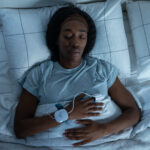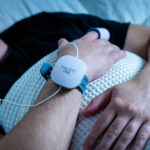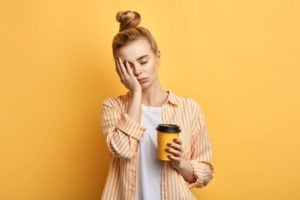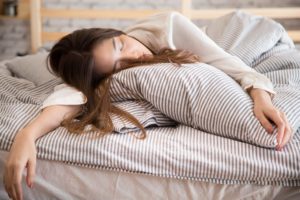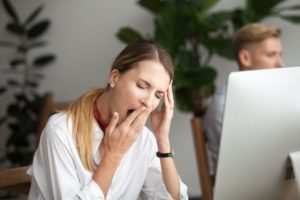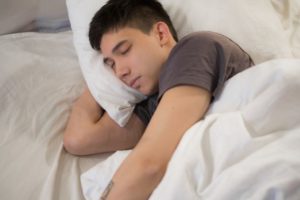When you buy through our links, we may earn a commission. Products or services may be offered by an affiliated entity. Learn more.
Treatment for Excessive Sleepiness
- The underlying cause of excessive sleepiness determines the appropriate treatment.
- Sleep hygiene improvements often can help improve sleep quality and overall well-being.
- Speak to your doctor about any medications possibly causing sleepiness.
- Sleep disorders may require medical interventions or behavioral therapies.
Excessive daytime sleepiness (EDS) refers to falling asleep or a desire to sleep when one is expected to be awake. EDS can impact alertness, concentration, attention, and overall health. While EDS is not a sleep disorder in itself, it may be a symptom of other sleep-related disorders. We cover the underlying conditions related to EDS, as well as potential treatment options.
Struggling to Stay Awake? Take an At-Home Sleep Test
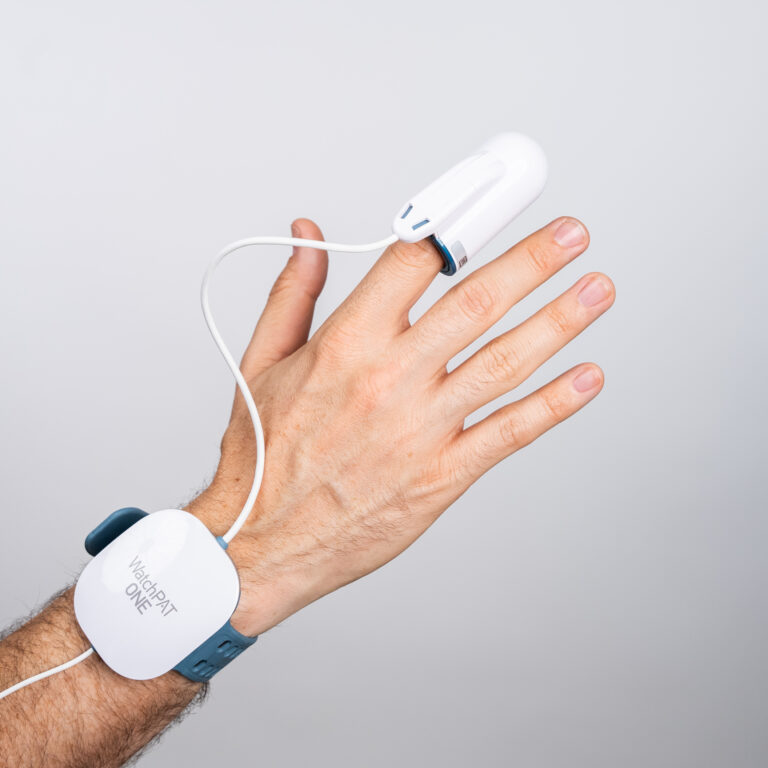
our partner at sleepdoctor.com
10% off Home Sleep Tests
Buy Now“Truly grateful for this home sleep test. Fair pricing and improved my sleep!”
Dawn G. – Verified Tester
How Is Excessive Daytime Sleepiness Treated?
Treatments for excessive daytime sleepiness vary depending on the underlying disorder. It is best to work with your physician to accurately identify the cause of your EDS in order to develop an effective treatment plan. As the disorders or causes are addressed — often using a combination of treatments — daytime sleepiness improves.
When it comes to treating EDS, physicians commonly identify one or more underlying disorders and recommend treatments accordingly.
- Sleep apnea: One of the most common treatments for sleep apnea is positive airway pressure (PAP) . PAP therapy is applied through the nose, mouth, or both through a machine, such as a continuous positive airway pressure (CPAP) or a bilevel positive airway pressure (BiPAP or BPAP) machine.
- Narcolepsy: Narcolepsy is typically managed through behavioral therapy, timed short naps, and proper sleep hygiene. Some wake-promoting medications can also be used to help with staying awake during the day.
- Insomnia: For both adolescents and adults, cognitive behavioral therapy (CBT) is typically the first treatment approach for insomnia. Pharmacological treatment is a secondary, short-term treatment to be pursued along with CBT.
- Circadian rhythm disorders: Some circadian rhythm disorders, such as sleep phase delay in adolescents, can be treated with a combination of light therapy in the morning and melatonin in the evening. However, it is best to consult with a doctor before trying this treatment method.
- Restless legs syndrome: Symptoms of restless legs syndrome can be relieved by practicing good sleep hygiene. Other treatment methods may include iron supplements, prescription medications, pneumatic pressure therapy , and regular exercise.
Other causes of EDS include inadequate sleep hygiene, excessive use of caffeine or other stimulants, chronic drug and alcohol use, and insufficient sleep. Sleep deprivation that leads to EDS is often a consequence of altered sleep patterns, like those that occur due to jet lag or shift work.
Sleep Hygiene and Excessive Daytime Sleepiness
People with excessive daytime sleepiness may also want to consider improving their sleep hygiene. A number of simple lifestyle changes can be made to promote sleep hygiene and improve overall well-being.
- Optimize your sleep space: Ensure the bedroom is dark, cool, and quiet, and use the bed only for sex and sleep. Avoid bringing electronics into the bedroom at night, as these devices can emit light which interferes with the body’s sleep cycles.
- Exercise regularly: Moderate exercise during daytime hours has been shown to improve sleep quality.
- Be mindful of substance use: Reduce consumption of alcohol and caffeine.
- Create sleep-promoting rituals: Establish a consistent bedtime routine that includes calming activities like meditation, reading, or a warm bath.
- Get out of bed if you cannot sleep: If you are having trouble falling asleep after 20 minutes of lying in bed, get up and find a quiet, relaxing activity until you are sleepy.
What Medications Are Available for People with Excessive Sleepiness?
Although there are medications available for people with excessive sleepiness, they are often recommended along with other types of treatments, therapies, and behavior modifications.
- Wakefulness-promoting agents: This class of medications is used to treat excessive sleepiness in patients with narcolepsy and residual sleepiness in certain cases of sleep apnea. Scientists believe these drugs affect the sleep-wake centers in the brain.
- Stimulants: Stimulant drugs may be used to treat narcolepsy and encourage alertness. Some are also prescribed to people who have ADHD.
- Benzodiazepine receptor agonists: These hypnotics are used to help with nighttime sleep . Improving the quantity and quality of sleep at night can help reduce EDS. However, there is a risk of dependency, loss of effectiveness, withdrawal symptoms, or overdose with this class of drugs.
Consult your physician before starting or stopping any medication. Ensure they are fully aware of your health history, including allergies, mental health concerns, and physical conditions. Also, share with them any other medications, herbal supplements, or over-the-counter drugs you take, as these could interfere with prescribed medications.
If you receive a prescription to treat excessive daytime sleepiness, carefully follow the directions provided by your physician and pharmacist. Avoid any potentially dangerous activities such as driving until you are sure of how the medication affects you. Remember that these medications can have a variety of side effects. Take note of any side effects you experience and report them to your physician.
Do Supplements Help Treat Excessive Daytime Sleepiness?
Some over-the-counter caffeine pills are intended to help you stay alert, and can contain as much or more caffeine than a cup of coffee . Although some of these pills may provide an energy boost, they can also have negative side effects such as jitteriness, headaches, and increased heart rate. Excessive caffeine can also impact your circadian rhythm, making sleeping at night more difficult. Also, as a person becomes dependent on caffeine, it can be less effective at providing alertness.
Sometimes people opt for herbal supplements in hopes of obtaining better sleep. Common choices include chamomile, lavender, and kava. However, little research has been conducted on these supplements and there is little evidence to suggest their positive impact on sleep. For instance, chamomile does not appear to help people with insomnia sleep better but may help improve the quality of sleep for people without insomnia . Kava can be used to treat anxiety , but its effect on sleep has not been comprehensively studied. Kava usage may negatively impact liver health.
Some people with circadian rhythm disorders benefit from taking melatonin supplements before bedtime to help them fall asleep and wake up on time.
Overall, it is better to focus on sleep quality and quantity whenever possible rather than relying on supplements. A daily routine and good sleep hygiene can help you feel well rested.
Medical Disclaimer: The content on this page should not be taken as medical advice or used as a recommendation for any specific treatment or medication. Always consult your doctor before taking a new medication or changing your current treatment.

Still have questions? Ask our community!
Join our Sleep Care Community — a trusted hub of product specialists, sleep health professionals, and people just like you. Whether you’re searching for the perfect mattress or need expert sleep advice, we’ve got you covered. Get personalized guidance from the experts who know sleep best.
References
6 Sources
-
Epstein, L. J., Kristo, D., Strollo Jr., P. J., Friedman, N., Malhotra, A., Patil, S. P., Ramar, K., Rogers, R., Schwab, R. J., Weaver, E. M., Weinstein, M. D., & Adult Obstructive Sleep Apnea Task Force of the American Academy of Sleep Medicine. (2009). Clinical guideline for the evaluation, management and long-term care of obstructive sleep apnea in adults. Journal of Clinical Sleep Medicine, 5(3), 263-76.
https://pubmed.ncbi.nlm.nih.gov/19960649/ -
Lettieri, C. J., & Eliasson, A. H. (2009). Pneumatic compression devices are an effective therapy for restless legs syndrome: A prospective, randomized, double-blinded, sham-controlled trial. Chest, 135(1), 74-80.
https://pubmed.ncbi.nlm.nih.gov/19017878/ -
Schwab, R. J. (2020, June). Insomnia and excessive daytime sleepiness (EDS). Merck Manual Consumer Version., Retrieved April 11, 2023, from
https://www.merckmanuals.com/home/brain,-spinal-cord,-and-nerve-disorders/sleep-disorders/insomnia-and-excessive-daytime-sleepiness-eds -
MedlinePlus: National Library of Medicine (US). (2021, September 8). Caffeine., Retrieved April 11, 2023, from
https://medlineplus.gov/caffeine.html -
The National Center for Complementary and Integrative Health. (2020, May). Chamomile., Retrieved April 11, 2023, from
https://www.nccih.nih.gov/health/chamomile -
The National Center for Complementary and Integrative Health. (2020, August). Kava., Retrieved April 11, 2023, from
https://www.nccih.nih.gov/health/kava


